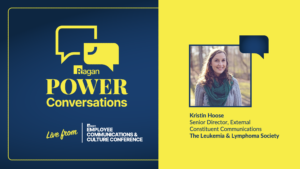Communicators are critical to rebuilding trust in healthcare. Here’s why.
Unpacking the Edelman 2024 Trust Barometer.

If there’s one thing people should be able to place trust in, it’s the people and institutions charged with taking care of their health. But with misinformation around healthcare (particularly in our post-COVID landscape) run rampant, trust in providers is constantly under fire, and it often comes down to communicators to help employees understand how to get reliable care and information as part of their benefits.
The 2024 edition of the Edelman Trust Barometer explored the cross-section between healthcare and trust, how it impacts healthcare consumers and their relationships with their workplaces (through which they receive their healthcare benefits). Because communicators at any organization are often responsible for keeping employees informed about their healthcare benefits and resources, they are in a unique position to help educate employees about where and how they can find reliable, trustworthy healthcare information. For a deeper look into the study, we spoke with Courtney Gray Haupt, global chief communications officer and U.S. chair for the health sector at Edelman. She shared a detailed look at Edelman’s methodology in the study, the takeaways for communicators, and more.
A shifting landscape
During the pandemic, healthcare was politicized and made a topic of everyday discourse, and as a result, disinformation and mistrust in healthcare saw a spike over the last few years. That’s led to an erosion in trust for many institutions, including business and the media. But only one entity in the survey was reported as trusted — and that’s employers.
According to the survey of over 15,000 respondents in 16 countries, 68 percent of those polled said they’d trust their employer to do the right thing regarding their health.
That’s an important finding because the employer is still the only institution that stands trusted,” Gray Haupt said, “Even after declining 4 points globally over the past year, it still has a lot of equity in where people are looking and believing what employers have to say.”
She added that the impacts of this trust go far beyond the walls of any workplace.
“When employers and other companies are thinking about the role that they play, not just in the health of their employees, but also the communities that they serve.”
And much like COVID itself, the fallout from the pandemic lingers on in the exchange of information as well. Remember the phrase “doing your own research” during the vaccine rollout? Although it was often joked about, it’s very much a real sentiment post-COVID. In the Trust Barometer, the data found that less than 4 in 10 people felt empowered by or had trust in the healthcare system.
That leaves a lot of gaps to fill as communicators, especially concerning healthcare offerings. Gray Haupt said you can help rebuild that trust with employer comms that focus on the company’s mission to its people.
“We know that employer communications are incredibly trusted, so it’s about working with that trust,” she said.
This is also an opportunity for comms pros to rethink the channels used to share healthcare information. Not getting much traction in an email or on the intranet? Consider a video or blog announcement that spells things out more. The method should be customized to the audience and should seek to include cross-departmental collaboration with HR when possible.
“Carefully consider how you are sharing information, and you’ll continue to build trust if you are sharing that information effectively,” Gray Haupt said. “It’s not all on you — collaboration and strategy can help you figure out what to share and when. Social and digital channels are very important so that we can reach people across the board.”
Empowerment and trust
If you’ve earned the trust of your employees regarding the management of their healthcare, that’s a big win. But there’s more work to be done.
The Trust Barometer reported that employees wanted to see their employers actively address issues of health and wellbeing in the office, including employee accommodations, public health issues and burnout.
According to Gray Haupt, communicators can deepen trust by sharing data and outcomes, which can go a long way toward backing up decisions that are being shared.
“You have to show stories of impact,” she said. “What is it going to mean to people like me and my communities? So I can understand not just the data, but that you get who I am and all these other things happening in my life that create a personal health outcome.”
Sean Devlin is an editor at Ragan Communications. In his spare time he enjoys Philly sports and hosting trivia.









